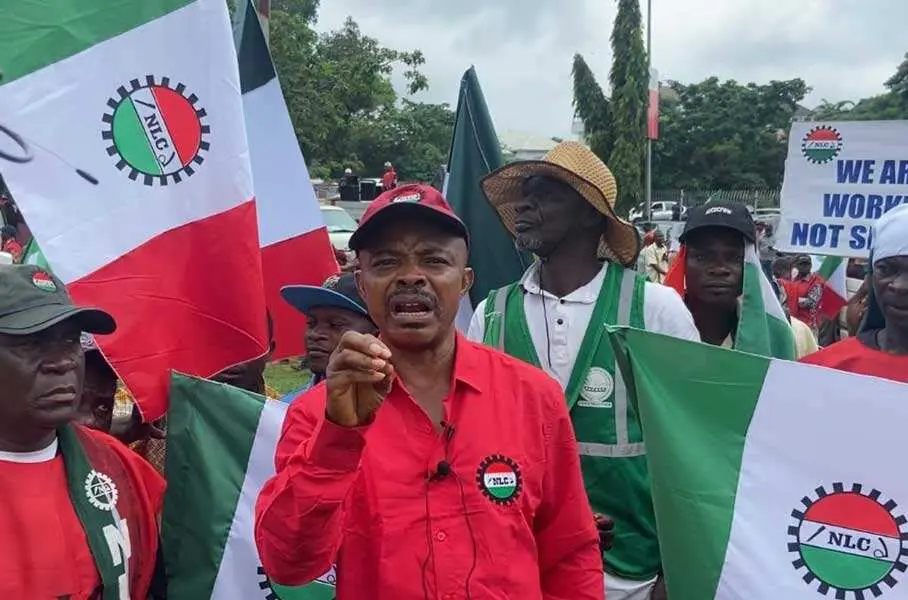The Nigeria Labour Congress, NLC, has said that it is going ahead with its two-day warning strike beginning tomorrow, saying it was not aware of any meeting with the Federal Government today.
A top official of the NLC, told Vanguard yesterday, that as of press time, there was no invitation from the Government for any meeting, adding that the industrial action was instigated by state councils and industrial unions.
However, the Minister of Information and Orientation, Mohammed Idris Magaji. said the Federal Government is in discussion with Labour over the planned strike.
He said that the Minister of Labour and Employment, Simon Lalong, met with the leadership of the NLC on Saturday, adding “We are very hopeful that the strike may be averted.”
The minister said the government will continue to appeal to Organized Labour to see the reason and the efforts of the government in providing palliatives through state governors and the Conditional Cash Transfer programme.
He said the government’s position was to pass the palliatives through state governors, irrespective of party affiliations, because the effect of the subsidy removal is felt more in states.
While appealing to Organized Labour to collaborate with the government to ensure that all efforts put in place to reposition the economy and turn things around for good yield the desired results, the minister said the government will continue to engage with labour to avoid the planned strike.
But NLC said its decision to embark on the two-day warning strike as a precursor to indefinite industrial action, was informed by pressure from unions and state chapters over the excruciating sufferings their members are facing as a result of the removal of fuel subsidy.
It was gathered that other factors that compelled Labour to declare the strike included the Federal Government’s ‘deliberate’ refusal to adhere to understandings reached with Organised Labour at the inception of subsidy removal.
The National Executive Council, NEC, meeting of NLC, made up of all elected national officials and senior secretariat staff, presidents, secretaries and treasurers of affiliate industrial unions as well as chairmen, secretaries and treasurers of state councils, were said to have almost become uncontrollable after members learned that none of the committees including the main committee set up to find measures to cushion the effects of subsidy removal had met since they were set up.
Critical committees failed to meet
“The main committee (the Steering Committee) and the three sub-committees on Mass Transit, Energy and Compressed Natural Gas, CNG, were said to have not met for once while the federal and state governments are busy dishing out unsustainable, unrealisable and un-coordinated palliative measures that cannot assuage the hardships being inflicted on the majority of Nigerians especially workers and the poor masses by fuel subsidy removal and other perceived anti-poor policies,” a member at the meeting lamented.
Sources at the Friday NEC’s meeting informed that reports of hardship, suffering and frustration, increasingly rising prices and unaffordable essential goods and services especially food items from state councils and industrial unions affiliated to NLC broke the camel’s back.
The state councils and industrial unions were also said to have complained about increasing job losses, short payment of salaries, delayed wages, and pensions of workers and retirees, which have them frustrated and helpless.
Upsurge in stealing, untimely deaths
They were also said to have lamented the upsurge in burglaries, petty thievery, untimely deaths among others in states, communities and villages since subsidy removal.
A general secretary of one of the private sector unions, who spoke on condition of anonymity, told Vanguard that it was the state councils and industrial unions that forced the NEC into taking the strike option.
How state councils forced NEC to call strike
According to him, “You know the state councils are closer to workers and masses especially at the grassroots or local levels. Their reports from their states were about mass and increasing poverty, unbearable hardships, suffering, frustration, despair and hopelessness across the nooks and crannies of the nation.
“Some of the state councils especially from the Northern part of the country said labour leaders are becoming vulnerable to attacks by angry citizens, who question the rationale behind NLC’s inaction in the midst of the mass sufferings pervading the land. One of the chairmen of the state councils said the state NLC’s bus was attacked by angry, residents, who asked if NLC was waiting for Nigerians to start dying in droves before the leaders would take action.”
Similarly, a president of one the affiliate unions, told Vanguard that the voices of the state councils and industrial unions overwhelmingly silenced others canvassing for the government to be given more ropes to climb.
He said: “You needed to be at the meeting. It was tense, charged and almost uncontrollable as most state councils and union leaders said they had nothing to take back to their members than the strike option.
“In fact, leaders of affiliate unions’ in the private sector lamented increasing job losses, unpaid salaries, short payments of salaries, delayed wages, and employers’ resort to all forms of unfair labour practices including casualisation and de-unionisation of workers to remain afloat.
“They complained about harsh and other unfavourable government policies such as inaccessible foreign exchange, unstable electricity supply, multiple taxation, unsold goods, insecurity and dearth of infrastructure, especially roads, which the employers are directly and indirectly making workers and the poor masses to bear the brunt.
“These and others, including insecurity have stifled manufacturing and other economic activities. Labour leaders are being accused of compromise for not taking action to force government to listen and address the plights of workers and the masses. These and other issues targeted at unions and workers made the strike option inevitable. No other resolutions than the strike option would have been acceptable.”
Recall that while briefing on Friday after its NEC’s meeting, NLC President, Joe Ajaero among others, said “NEC in session of NLC resolved to embark on a total and indefinite shutdown of the nation within 14 working days or 21 days from today until steps are taken by the government to address the excruciating mass suffering and the impoverishment experienced around the country.
He said the NLC will “commence a two-day warning strike on Tuesday and Wednesday, 5th and 6th September 2023 to demonstrate our readiness for the indefinite strike later in the month and to also demand that the state vacates the illegally occupied national headquarters of the National Union of Road Transport Workers.”
The NLC also resolved to embark on a mass protest and rally in Imo State within September.
The NLC raised the alarm over what it described as renewed onslaught by government and its agents against labour unions.
Ajaero explained that the proposed strike action was necessitated as a result of government’s deliberate neglect and disregard to engage the relevant stakeholders through the channel of social dialogue.
He said the Federal Government had refused to engage and reach an agreement with organized labour on critical issues on the consequences of the unfortunate hike in price of petrol which has unleashed massive suffering on Nigerian workers and masses.
Ajaero said: “There is a renewed onslaught against trade unions and its leadership by the state and its agents across Nigeria.
The Police under the instruction of certain forces peddling the name of the President of the Federal Republic of Nigeria have invaded and occupied illegally the national headquarters of the National Union of Road Transport Workers headquarters seeking to install its own executive.”

